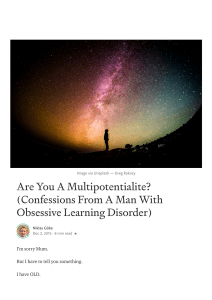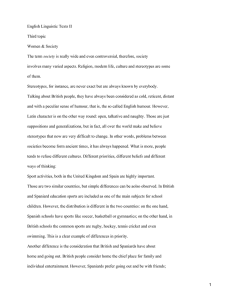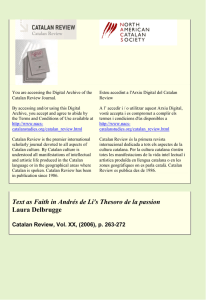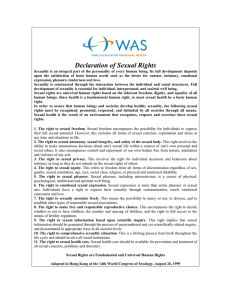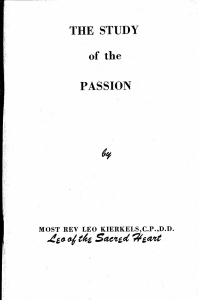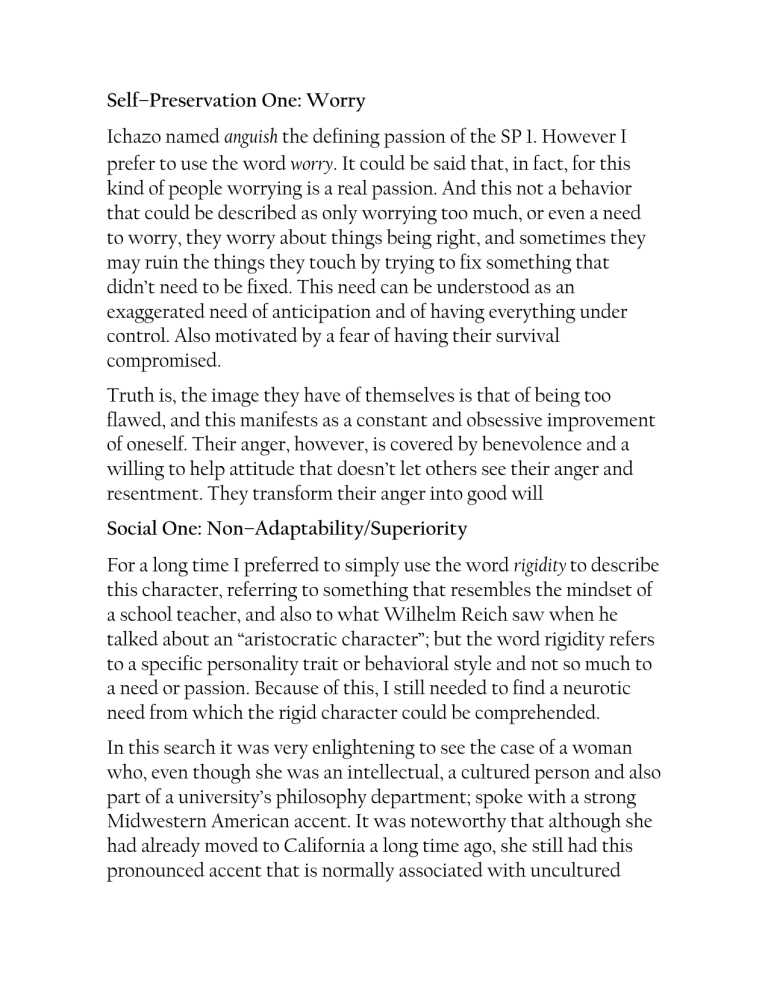
Self–Preservation One: Worry Ichazo named anguish the defining passion of the SP 1. However I prefer to use the word worry. It could be said that, in fact, for this kind of people worrying is a real passion. And this not a behavior that could be described as only worrying too much, or even a need to worry, they worry about things being right, and sometimes they may ruin the things they touch by trying to fix something that didn’t need to be fixed. This need can be understood as an exaggerated need of anticipation and of having everything under control. Also motivated by a fear of having their survival compromised. Truth is, the image they have of themselves is that of being too flawed, and this manifests as a constant and obsessive improvement of oneself. Their anger, however, is covered by benevolence and a willing to help attitude that doesn’t let others see their anger and resentment. They transform their anger into good will Social One: Non–Adaptability/Superiority For a long time I preferred to simply use the word rigidity to describe this character, referring to something that resembles the mindset of a school teacher, and also to what Wilhelm Reich saw when he talked about an “aristocratic character”; but the word rigidity refers to a specific personality trait or behavioral style and not so much to a need or passion. Because of this, I still needed to find a neurotic need from which the rigid character could be comprehended. In this search it was very enlightening to see the case of a woman who, even though she was an intellectual, a cultured person and also part of a university’s philosophy department; spoke with a strong Midwestern American accent. It was noteworthy that although she had already moved to California a long time ago, she still had this pronounced accent that is normally associated with uncultured people. Being a SO 1, you could say this was her way of expressing her inadaptability, but how can we understand such a trait coming from an underlying motivation? In this case, people tend to adapt to the environments way of speaking, so there was the question: Why did she care so little about it? I only had to make that question to realize the answer was in her strong tendency to always feel right. She acted as if the thought “My way is the right way” meant that other people were the ones who had to adapt. And that could also be seen in her language mistakes that didn’t correspond to her cultural level, which could also be understood as a result from this belief of being someone exemplar However, feeling a need to think I’m right isn’t a motivation or passion either. And if we want to explain the contrast between a SP 1 and SO 1, who already feels perfect and is prone to committing horrible mistakes, we have to remember the need of being superior, in front of which, SO 1s take the stance of being perfect and faultless. The SO 1 has a passion for feeling “I’m right and you’re wrong” and this means some sort of power over others when making them feel wrong. It’s as if they thought “you’re wrong, so I have the right to dominate the situation” It’s a good technique, that of dominating others through making them feel they’re wrong, and it could be understood as an alternative to the SX 1 way of establishing dominance through assertiveness, taking possession and feeling in the right to. All this characters feel a hidden moral superiority. So it’s useful to point out there’s a big difference between morality and moralism, and that is what’s so immoral about 1s, their apparent morality is nothing more than moralism Sexual One: Vehemence/Zeal Ichazo used the Spanish word celo (Zeal) in reference to the passion of the SX 1, and this word comes with a double meaning. When talking about an animal in heat, the word indicates a great deal of sexual arousal; when talking about this personality, saying things are done with zeal means doing something with care, caution, dedication and enthusiasm. So zeal in its broader sense, is something akin to an animal in heat pursuing the object of its desire with a great deal of intensity. So the SX 1 has a special intensity related to their desires that makes them eager and urgent. If we want to understand why anger transforms into zeal in the sexual subtype, we can say that anger potentiates desire, infusing it with aggressiveness. In other words anger causes desire to be accompanied by forcefulness and intensity, in a way that not only makes the person feel strongly pulled towards their own satisfaction, but also makes them feel entitled to it. This results in a type with a strong spirit of domination and conquest. I’ll explain it with a group behavior, when the Europeans extracted diamonds and emeralds by exploiting African mines, lots of people opposed by saying that those resources belonged to Africans. In response, a lot of people completely convinced of their reasoning replied “What will they use it for? They’re savages!” And it seemed obvious that those diamonds and emeralds were property of the European because of their civilized character, in contrast to the “primitiveness” of the native. The same occurred with Spanish conquerors, who in the name of their holy emperor, felt they had a right to take Aztec gold for themselves In a similar way, some people feel more entitled than their peers to life’s pleasures, to the satisfaction of their desires, and even to exploit others. There’s not only an intensity of desire, there’s also the delusive notion that the satisfaction of ones desires justifies aggressive actions and frees them of guilt A youngling explained that when he was 6 years old, he liked to put his penis between his sister’s ass cheeks. Her mother told her no and reprimanded him; to which he replied “Why not?” I’ve have never heard such an answer coming from a young child; “Why not?” Because we live in a repressive enough culture, it’s common that when a kid is reprimanded by their parents because of sexual activity, they think about it as a shame, and in some cases the guilt may lead to traumas. For a SX 1, however, the strength of their impulses is so great that the person – just as is the case with the lustful subtypes – prefers to question authority rather than the strength of their desires Self–Preservation Two: Privilege In the SP 2, seduction can be compared to that of a child with his parents. Just how the social subtype shows itself as someone big, this is someone that can be seen as small, childlike in their attitude and even in their physical traits. The SO 2 looks adult and too mature; and the SX 2 looks like a force of nature, wild. But the SP 2 looks cute and childish Precisely, psychoanalysts describe this character as infantile. Ichazo used the phrase “Me, the most important” to describe this neurotic need, which at the time I misunderstood as the Napoleonic action of someone who takes a prideful stance. Finally, I understood this behavior differs from the desire for importance that an ambitious person has, this “Me, the most important” thinking refers to the egocentrism of a child, which translates into the desire of being at the center of everyone’s attention without actually having to be important through qualifications, efforts or achievments. Because a child doesn’t want to be loved for this or for that, but simply because. For what he or she is The most prominent part of this human type, is the need for love, the naked need for love; that isn’t obtained through sexual seduction or sense of self-importance But the question arises, “Why would a person have a need to remain childish or to act like a kid?” Naturally, there must be some advantage. Children are more likeable than adults, and babies are very attractive to people with maternal instincts. It could be said that childlike traits in and on themselves are seductive, and the neurotic need of this subtype is that of seducing through childishness, which implies a need for cuteness, delicacy and fragility, but also means egocentrism and responsibility evasion Social Two: Ambition In the SO 2, pride manifests itself as satisfaction in conquering the public To inspire great passion in others it isn’t necessary to develop a lot of intelligence, neither faking it, but a SO 2 would never be satisfied with being seen as a “Dumb blonde”. A SO 2 needs to be someone, and to be someone you need to use your mind. Because it’s a person that wants to be important in order to feed his pride, they have to be able to seduce their social environment, transforming into a group charmer, a distinguished person, and maybe not only someone superior, but someone with a gift for leadership Ichazo talked about ambition, but we could say it’s a passion for being above others; and through this position, having influence and advantages. This is the kind of person that presents itself to the world as someone big and important, different to the SX 2, who wants to be someone important to their partner, and to the SP 2 who is a counter–two. Sexual Two: Conquest The SX 2 is the 2 by excellence, because 2s are seducers, and we can say that the SX 2 is the most visibly seductive They’re the type of person that can tell others “I will do everything for you” but when the times comes to take on their offer, it’s obvious that they’re incongruent in their help offers. Because of this I think it is more precise to say that the central theme is seduction (that is to say, the expression of warmth in order to obtain interest, loyalty, protection, etc., from others) and only seemingly help The term vampiress can shed some light on this, and also the expression femme fatale. Both reference a beautiful person, but it is a dangerous beauty, which needs to have you grabbed and could end up devouring you The need for seducing others implies a need for other’s desire; but to say the desire is only sexual would be to only point out what’s obvious; when making some research and asking such people what they want we receive more original answers, such as “I want it all”. So when we think about Helen of Troy as an archetype of the woman for whom wars are fought and men are willing to lose their lives over, we could say SX 2s aspire to such irresistibility that inspires great passion. Problem is, normally this people are not honest enough to say: “What I really want is a giant who gives me everything I want whenever I want it” With this, we comprehend that there are people out there that think inspiring passion in others is a way to solve all of life’s problems, and that sexuality can translate into money, castles and essentially white checks: this is how the SX 2 thinks Self–Preservation Three: Security When talking about the SP 3 , we can’t exactly say we are in front of a vain person (in comparison to the Sexual and Social subtypes), because just like the Self Preservation subtype of the prideful doesn’t seem prideful, the Self Preservation subtype of the vain isn’t visibly vain. I’ve come to characterize this people as “counter–vain”, using a language similar to that of psychoanalysts when introducing the “counter–phobic”, referring to people who hide fear by engaging in visibly fearless actions Through the years, I’ve come to see this is true for the Self Preservation cases amongst each of the passions. For example, in SP 1s anger is masked and fought against through benevolent attitudes The case of the SP 3, who doesn’t look that vain, is similar to that of a person who is so determined to be good (that is to say, the perfect role model, the ideal mother, a good house wife, etc.) that this way of living translates into a hidden taboo to vanity. Because of this, it can be difficult to recognize a SP 3 and they might be confused with a 1. If we ask what their neurotic need is, what is the thing a SP 3 needs above all else, it may seem that what they need is to be good; but this a universal principle, that applies to most people’s lives (even when some people may rebel against this). More specific to the SP 3 is the concept, coined by Ichazo, of security, and to me it looks like a threatened sense of security causes these persons to develop great independence. Because they weren’t properly taken care of, they learned to take care of themselves, and then to take care of others. Around SP 3s there’s an atmosphere of security, and they tend to be the person someone goes to when they need advice. This passion for security may cause their lives to undergo excessive simplification, but at the cost of reducing their interests to the most practical and useful. Besides, when prioritizing efficiency above all else, one ends up making efficient, efficiency itself Social Three: Prestige To describe the passion of the SO 3, Ichazo proposed the term prestige: we can say the SO 3 is someone with a passion for shining, not only through their work, but also through the way they present themselves to others. It’s as if they had an advertising department inside of their psyche. The passion for prestige, understood as a need for social acknowledgement, leads to the need for everyone’s applause and not only some. This behavior consumes excessive energy, which naturally interferes with spontaneous action. None of the subtypes of the 3s are described in the DSM-IV, which surely reflects the fact that the corresponding traits, oriented towards good performance, practicality and success, are idealized by our modern culture, in which it can be said that the SO 3, in particular, has become the exemplar personality of this secular and technocratic world The SO 3 is the most chameleonic of the 3 subtypes. They’re also the vainest of the vain. In contrast to the other 3s, this is a strong and reactive character, power hungry, even if they don’t control it directly, but through other people they second Sexual Three: Attractiveness For the passion of the SX 3, Ichazo use the words masculinity or femininity, depending on the case. More accurately, I used to explain it as an excessive attempt to mold oneself to the cultural images (maybe Hollywoodesque) of what’s masculine and feminine. Today to me it seems that the central pathology of these people resides in the fact, that instead of acting from an instinctual freedom, they pour all their passion into their thirst for love and into the corresponding seduction, through being complacent or the image supposed to be attractive and exciting. This results in a woman who, because of being so keen on being liked by the man, loses her ability to enjoy. There’s also a certain passion for family in this character that, while not seeming like a defect, translates into an exaggerated need to please that only perpetuates self-alienation Of the three subtypes, the sexual is the most dependent. Doesn’t tend to show aggressiveness and can’t take being rejected. Their seduction comes from the need for being taken in and assured, confusing their own value with their body’s attractiveness Self–Preservation Four: Tenacity Different from the “sufferer” (SO 4) and from the “insufferable” (SX 4), is the character known as the “suffered” (in Spanish “sufrido”), expression that describes a capacity to endure and to frustrate oneself Instead of being a person who cries too much, the suffered is someone who doesn’t complain and avoids crying in front of others, someone who has learned to swallow a lot and to bear pain without wincing How could we explain this behavior with a motivation? What could push a person to become a masochist? It’s like a telling a parent or a loved one: “See that I’m not complaining? Do you love me now? See how much of a good boy/girl I am?” The SP 4 pretends to make a virtue out of the resistance to frustration, I’ve explained it lots of times with the anecdote of Lawrence of Arabia, who in the famous film is shown lighting a cigarette and then turning off the match with his fingers. Someone asks surprised “What are you doing?” And he explains that this is his way to train himself in order to endure pain. He had developed this ability to stoically bear with pain from childhood, and this was surely useful during his feats, which gave him the fame of great hero, because no one, even amongst the Arabs, had the endurance to resist the harshness of the desert in such a way In the SP 4, endurance is a passion, but how to explain it? I think the key is in the introjection of voracity. The envy that is visible in the SX 4 as aggressively demanding and insistent, in this subtype turns into a “counter–envy” directed towards the person themselves, now in the form of self-demand, while also being “selfdevouring” Social Four: Shame The contrasts between the three subtypes of 4 are the most striking, because their subtypes are the most different from each other in comparison to the other passions The SO 4 is a person that laments too much, is too weepy, and tends to put oneself in the role of the victim. The DSM-IV refers to a person with a tendency to self-sabotage. The characteristic appointed by Ichazo is shame, which descriptively I consider right but it doesn’t describe a neurotic need. Certainly, they’re people that underestimate themselves and because of this they feel less than other people. But, how to explain that this people are so inclined to self-blaming and to comparing themselves unfavorably to others? To me it seems, that the answer is in what Melanie Klein called the depressive position, through which the child prefers to blame him or herself instead of unloading the rage against the mother, whom is needed exaggeratedly. In a similar way we can say that the SO 4 is someone who prefers to swallow their own venom rather than exteriorizing it against loved ones; has learned to interiorize aggression in sight of the exaggerated affective dependency Sexual 4: Hate If the SO 4 suffer more than the other subtypes because of feeling guilty of any desire, the SX 4 turns against shame by becoming shameless in order to satisfy their intense desires. Even if it’s shameful, they will knock on every possible door. They become insistent, even against frustrations, as if they thought by the saying “the squeaky wheel gets the grease”. “The more I complain the more I get” they seem to think. Only that this strategy that worked well in their childhood doesn’t work as well as adults. People who are too insistent and demanding tend to be annoying and get rejected, and this originates a vicious cycle where rejection leads to protest and protest leads to rejection The name that Ichazo gave to the characteristic passion of the SX 4 was hate, which describe these people who are so expressive about their anger. But this may not explain their motivation enough, so to me it seems better to talk about competition or competitiveness We could characterize the envy of the SX 4 as an oral aggressive envy, which bites. Psychoanalysis talks about “cannibalistic” impulses. Not only wishing, but wishing mixed with anger. This is Cain’s sin, “I envy you, therefore I’ll kill you” I envy the rich, so I’ll start a revolution. I envy your intellect, so I’ll cut your head off (Then… I’ll look taller!) When talking about cutting heads, we´re talking about the contempt, invalidation and aggression that expresses itself in the devaluation of what’s enviable, as is the case with the fox and the supposedly green grapes Self–Preservation Five: Refuge The need to withdraw is a clear trait of the SP 5. But we have to keep in mind the fact that every subtype of the 5 has some of that: some kind of need to withdraw. In the case of the SP 5, the passion has to with finding refuge, to erect high walls that separate them from a world that could invade them, that can take them out of their beautiful little world that hides inside. The idea of Self–Preservation becomes clearer if we imagine them as firm supporters of withdrawing inside a cave. The SP 5 extremely limits his needs and desires, because every desire could mean a status of dependency to him Like every SP subtype, this subtype too is related to survival and what’s concrete, attached to objects and personal space; but as a 5, the most mental of the mental characters, it is in thinking, in the incessant reflection about the way of surviving and living through the limitation of external disturbances, where this subtype finds the greatest refuge Social Five: Totem If 4s are so intense that this makes their subtypes very different or contrasting, 5s in their usual lack of intensity, look more difficult to differentiate between their subtypes In reference to the passion of the SO 5, Ichazo used the word totem, which seems to me very evocative, a good image. But the passion of the SO 5 is something akin to the need for what’s essential, sublime, instead of what’s present. Totem indicates height and the character of being a built object more than a human being. The height of a totem evokes the tendency of this people to look upwards, to what’s ideal, and to interact with the most outstanding and salient amongst the people, kind of like Midas wanting everything he touched to turn to gold The tragedy is that, when the SO 5 looks for a higher value, they look down on ordinary life and normal people. They only care about the quintessence of life, existence’s elixir, the ultimate meaning. But in this orientation towards the stars, they become someone who cares little about life down here… They become too spiritual, because the emotional impoverishment, that distances itself form compassion, is precisely contrary to spiritual achievement. So in this character there’s a polarity between what’s extraordinary and what’s meaningless, because of this, nothing has any meaning until what’s extraordinary or magical is reached Sexual Five: Trust The word trust is the basic matter for the SX 5. Amongst them there are a lot of poets and artists. Nijinsky was a SX 5. He had an extreme expressivity, but it was cut off in a lot of aspects If one tries to find the difference between the SX 5 and the other subtypes of the 5 it wouldn’t be easy. However, if engaged in conversation, they’ll say they are very passionate about one person; generally, a person whom they cannot find in their lives. Here is a case similar to the search of the extraordinary of the SO 5, the extraordinary would be that atop of the totem; the SX 5 looks for a very high exemplar. The same happens in love: this subtype is in search of an absolute love, and this search is so strong that, if you’re the one being looked for, it’s very difficult to pass the exam. If someone looks for the absolute is very easy to be disappointed We have to understand this passionate search in the sense of trusting, of being able to trust in the other: the SX 5 is looking for a person who will be there because of and for him, it doesn’t matter how or what, it goes much further than the normal vows of a comprise or marriage. The thinking of the SX 5 is that he has to be able to show himself before you with the worst of his inner world, and you, as his partner, should maintain total equanimity before his inner demons, since he loves you so much… The love of a partner is lived as some sort of ideal, but it’s an ideal that doesn’t exist in the human world. The SX 5 is very romantic, this is the least 5 of the 5s. They can look very alike to other 5s until you touch their romantic spot: then their vibrant inner lifer will awake. Chopin can be a good example of this. Who but the most romantic of the composers? Chopin was more of an aristocrat. He was a bit rigid. Someone who knew him very well, Liszt’s lover, said that he was like an oyster with powdered sugar inside: he wasn’t very open, he wasn’t open to a deep intimacy, except with one or two persons. Chopin came from Poland, and he arrived to France while still being a teenager, but he didn’t make any new friends in France. He was at center of the high society, and all of his emotional life was replaced by music Self–Preservation Six: Warmth The SP 6 is the opposite of the SO 6. The SP 6 is warm, ambiguous, insipid and spineless. They don’t have the initiative to say that this or that is black or white. I takes a lot of courage to say that something is black or white. For him is better to say “oh, there are lots of shades of gray between one and the other. And I’m not sure of which kind of gray we are talking about, because life is too complex” And this can go on indefinitely, always beating about the bush Here we have a person who needs a lot of protection. Someone who is afraid of not being protected, fear that manifests as insecurity. Their characteristic passion is the need for counting on something akin to a friendship: a bit of warmth. What characterizes the SP 6 between the three subtypes of the 6, is precisely this search for warmth. They are teddy bears. They want to feel the embrace of a family, be in a warm place, in a familiar environment where there are no enemies In social interaction there’s a certain need to make allegiances along the lines of “I’m not going to hurt you and you’re not going to hurt me”, “I’m your friend, be my friend”. Freud said that this allegiances are the essence of friendship, but, in fact, they’re only the essence of a neurotic friendship: coming together out of fear of a common enemy, forming a group in the face of danger. The “I support you and you support me” phenomenon is common in humans, but the SP 6 does this constantly, in the desire of a little warm world Social Six: Duty Here it is what I call a “Prussian character”. The SO 6 is cold, very formal. Kant, as an example, was a great philosopher. He was Prussian, and Prussians had the kind of character that has a love for precision and an intolerance for ambiguity. This is, precisely, the complete opposite of the SP 6, who is warm and way too permissive with ambiguity Amongst the Nazis there were lots of SO 6s. Their behavior is very visible: “This is the line, the party’s line, the line that defines who the good and bad guys are… And what we need to do and we do it very efficiently” In efficiency, the SO 6 resembles a 3 Ichazo chose the word duty: it’s more than being only worried about the duty, because SO 6s are worried above all about the point of reference. They have the mind of a legislator, with clear categories. Their mental orientation is that of knowing very well where the north is, where the south is, the west, the east, and… And if they ever wanted to become human beings, first they’d have to go crazy and let go of all reference points. They need to forget about the duty, no duty, and connect with instinct and intuition, with life itself Sexual Six: Strength This is the so called counter–phobic character: the SX 6 goes against the world. So we could call strength this neurotic need. On a descriptive level, we could say strong in the same way a SP 6 could be called a weak person. One is a bunny and the other is a bulldog: the counter–phobic is very much like a barking dog. It doesn’t always bite, it barks more than it bites, but it has a fierce aspect. The need isn’t only to feel the strength, but also being able to intimidate. The internal program says that the best defense is a good offense A very illustrative joke about this: a man has visited lots of psychiatrists because he heard the sound of fluttering wings outside of his bedroom that don’t let him sleep. An innovative psychiatrist gives him a gun saying he’ll end his problem shooting, “because you know you’re so strong”. What followed was a great scandal, the man had killed his guardian angel So this demented individuals are the ones who go against danger, the ones who could kill anybody because everyone can become a danger Self–Preservation Seven It’s easier to recognize a SX 7 or SO 7 rather than a SP 7. To refer to him, Ichazo used the phrase “keeper of the castle”. He also uses the word castle for the SP 5, I prefer to use the word Refuge, liar. But, what is the meaning of the phrase “keeper of the castle”? The SP 7 is the person who makes allegiances. Family could be a good alternative. But not in the true sense of the word, that is filled with positive connotations. The word family describes an aspect of life. But in the specialized vocabulary of the ego, there’s a kind of game about family that can be played. In this, the SP 7 builds relationships with other people that are based on ideas like “I will be family for you and I demand that you will be family for me”, “Let’s get together, I will serve you and you will serve me”, “getting together, you and I can make a good mafia” I let drop the word smuggle because this kind of behavior can lead to gangster–like conducts. This can be seen as a clear partisanship. There’s a very present element of corruption. Self-interest, egoism are behind this allegiance, even if negated. Naturally, every form of ego depends on a lie that makes it look like it’s not even there. That’s why confession is so great, so interesting for working on the consciousness, more so, when this confession is public, because one realizes he can keep going on, keep being oneself So the SP 7 is the opportunist. Because of this, gluttony expresses itself as an excessive concern for getting out of this threat to the self-preservation making good agreements and deals on every opportunity A friend of mine was a dentist for a period of his life. He looked like a nice guy, amiable, talkative. Some like the profession of being a dentist because they have the others mouth shut, while they can talk and talk for as long as they please. You surely have found very talkative dentists. Maybe they don’t realize, unconsciousness tends to be troublesome. And is typical of the SP 7s to have a liking for doing something with their hands, something useful for others. They’re practical. Taking and talking, the SP 7 soon finds the others weak spots, “I’ve seen you bought a new car, how’s it going?” says the dentist “The car is excellent, I’m very happy with it” the patient answers back, “But sadly I have to sell it”, “Oh, well” the dentist takes advantage “Then I’ll buy it!” It seems that with the SP 7 there’s no conversation that doesn’t lead to business. They make instant deals because their mind is so alert for opportunity that they never let it pass. His stance is that of the person who thinks, if you’re not alert, if you don’t keep your nose up in the air in order to catch opportunities, you’re the loser Social Seven: Sacrifice The SO 7 is the counter-type 7, in the sense that it is harder to recognize the passion of gluttony in him, because of his efforts to hide it in an altruistic behavior that, in some way, should purify him of the guilt of feeling an attraction towards pleasure or one’s own advantage, This is an attraction that he tries not to feel by pursuing an ideal of himself and the world: sacrificing gluttony in order to be better and for a better world where conflict and pain don’t exist. SO 7s are people who, in appearance, don’t want to exploit others and don’t want to be bound to their desires. They’re very pure, too pure. There are some 7s that are very worried about their diet, about world hunger, etc. New Age fashion was an example of this SO 7 culture It’s as if the individual had the intuition of hiding a pig inside them and said “No! I will define myself by not being a pig” this is how the SO 7 is The word Ichazo used was sacrifice. However it’s a sacrifice of gluttony. It’s a postponement of one’s desire in the face of an ideal. The deceit is that these persons have a great gluttony for having their sacrifice recognized. They crave for being seen as good in other people’s eyes Now I will give a bad example about the SO 7, because I will be referring to the life of a saint, very revered in the Christian lore. It’s obvious that I’m talking about Saint Francis, he was that type of person Saint Francis lived by the kind of advice William Blake gave: “The fool who persists in his folly will become wise” If the demented and neurotic man lived his craziness to its full extent he will become a sage. It’s a path. So Saint Francis wished to be good. So he did all the things a 7 needs to do for healing: he lived miserably, he lifted rocks to rebuild the sanctuary… Nothing could be worst. So he did everything possible to detach himself from his 7 personality. But if we look into Saint Francis’s early life, there’s a very enlightening anecdote. Along his followers, he built a tent to refuge. Suddenly it started to rain so Saint Francis and his monks went to the tent so they could rest. But when they arrived they found a farmer with his cow inside the tent. And their generosity gave priority to the farmer and his cow. It seems to me that health, spiritual as well as mental, has to do with loving what your neighbor asks from you. But when you love your neighbor more than you love yourself, then you’re trying to be too good. This is very common for nuns, and some SO 7s may fall into this goodness stereotypes, that consist of trying to be good according to a social consensus or code. Today’s humans may feel tempted to think they have more rights than a cow, but maybe we are also wrong in this: Mother Nature has something to say about it. But, where’s the limit of goodness? There’s a certain goodness for applause, very characteristic of the SO 7 Sexual Seven: Suggestibility The SX 7 is not worldly, but heavenly. He’s not interested in the things of this world. It’s gluttony for the things of a higher, more advanced world. The SX 7 is what we could call a dreamer. To define it, Ichazo used the word suggestibility, which I understand as the passion for imagining something better than the desolate reality. It’s the passion for embellishing reality, for fantasizing, for seeing things through rose-colored glasses. In others words, is a form of idealization. If the word for the SO 5 is Totem, “totemizing” is a kind of superidealization, in the case of the SX 7 is more of an idealization of common things: the SX 7 looks at things with the same optimism that someone in love does. They say love is blind. It could be that the SX 7 is blind in the same way. They are too enthusiastic The passion is that of dreaming, that of going towards the sweet of the imaginary instead of being in touch with the ordinary and not so interesting reality. Carl Abraham, a Freud collaborator that had a better eye than him for describing characters, talked about a character that’s completely optimistic in all senses “I’m fine, you’re fine, everything is fine” And naturally this can be very therapeutic… For everyone but a 7. Or said in a different way: A life of virtue is good for anyone that isn’t a nun Self–Preservation Eight: Satisfaction The most armed of the 8s, the SP 8s. The word that corresponds to them is satisfaction, “I have to have it. This is mine. I have to have it”. It’s more of an intolerance to the frustration of what they want to have rather than having it. In this sense, this looks a bit like a characteristic of a SX 1, who also obsesses over his desires. But a SX 1 is very different from a SP 8, the 1 is hypersocial, while the 8 is totally antisocial. One is too preoccupied with social norms, and the other too little The SP 8 pursues the satisfaction of their needs. They don’t tend to talk much. It’s like a lion. A lion only moves when hungry. He seeks to satisfy his unsatisfied hunger and then sleeps the rest of the day. Very majestically. It’s like a “no-nonsense” attitude, no talking, there’s no wordplay with a SP 8. We could say that they have a need for an exaggerated egoism. They are the people that know how to do business and how to bargain in order to put themselves above everyone. There is the expression: a used car dealer. This the art, or gift of the SP 8. But it’s also their necessity: they’re survivors, a term that has been used to describe 8s in general, but is more descriptive of the SP 8. They know how to survive in the harshest situations. They know how to get stuff, and how to get away with the things they do Social Eight: Complicity The SO 8 is a kind of “social antisocial”
